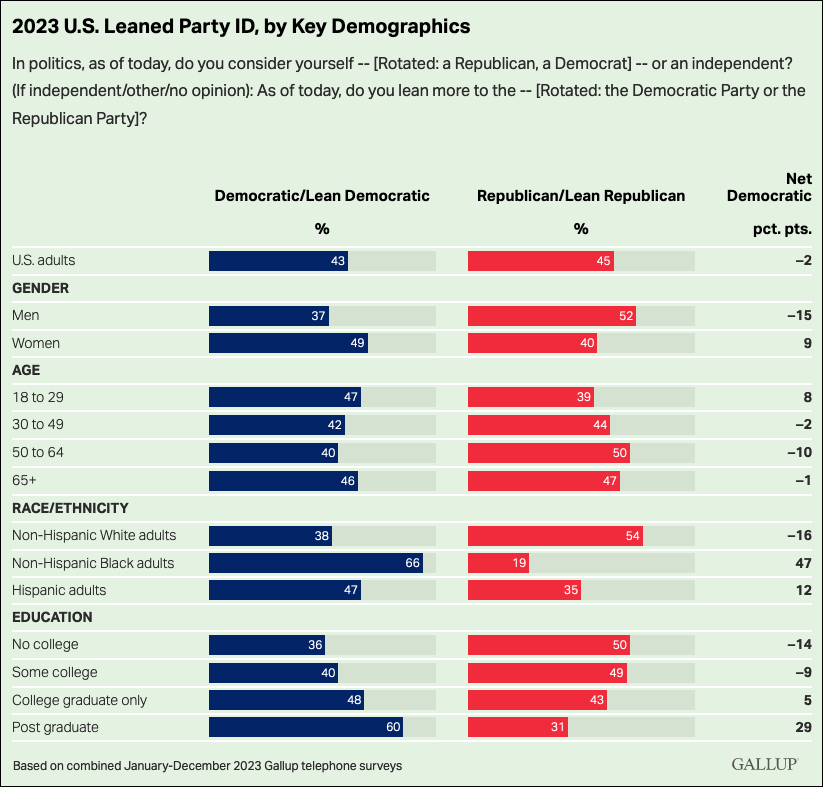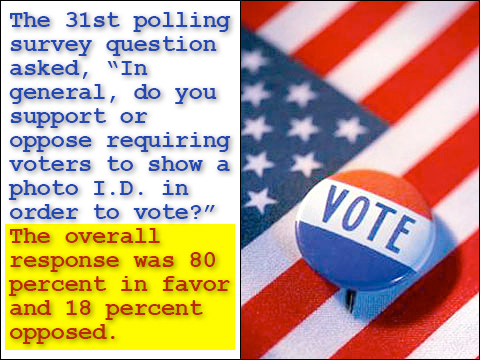
Gallup Poll Results: To see complete story/data/polling results, go to: Gallup News
By Jim Ellis — Friday, Feb. 23, 2024
Polling
Nationwide Polling: Multiple Demographic Swings — The Gallup research organization released a new nationwide study earlier this month, which is a part of the entity’s Gallup Poll Social Series. The surveys are conducted throughout the year, of at least 1,000 US adults, and they cover 12 different topics annually, meaning a different subject matter each month.
The current release covers where certain segments of the American electorate now stand with reference to their political party preference. One of the key findings is that both parties are gaining strength among some constituencies, while losing it among others.
Gallup finds the Republicans are gaining strength with minority voters, while Democrats are clearly becoming the party of the higher educated.
Among black voters, Republicans have gained almost 20 percentage points just since 2019 when compared to Gallup’s historical surveys. While still having a strong allegiance toward Democrats, blacks now only favor the party by a 47-point span. In 2019, the Democratic margin over the Republicans was 66 points, and even that figure is down from the Democrats’ apex point of 79, which was reached in 2008.
Among Hispanics, Democrats reached their apex in 2016 when they enjoyed a 36-point preference margin over Republicans within this demographic. The current Gallup national survey yields a stark result, finding the Hispanic Democratic advantage today has slipped to only 12 percentage points.
The non-Hispanic white category has also moved considerably toward Republicans, though it wasn’t long ago that the Democratic share of the national electoral vote was at parity with Republicans. In 2007, Democrats had a one-point edge over the GOP within the non-Hispanic white segment. Currently, the pollsters find the spread at 17 points between the two parties, favoring Republicans.
The news isn’t all bad for Democrats, however. Gallup continues to see major shifts among the higher educated voters who are significantly breaking away from the Republicans. Today, the trend shows a 29-point Democratic advantage over Republicans among postgraduate individuals, which is a considerable shift from 2010 when the Democratic edge was 11 percentage points. During that same time frame, the college graduate sector has gone from a nine-point preference for Republicans to what is now a five-point edge for Democrats, which is a swing of 14 points toward the latter party.
In the education category, however, the group that has demonstrated the most radical swing are those not having gone to college. In 2006 through ’08, the Democrats had a consistent 16-point edge. The latest Gallup survey finds almost the opposite result, with Republicans now holding a 14-point advantage within this same category.
Though these particular demographic and personal trait segments are reporting some different partisan allegiance predispositions this does not necessarily mean we will see a commensurate change in voting behavior. Obviously, the candidates matter as does the persuasion communication method developed for the individuals comprising these groups who are apparently more receptive to a different political message today than those from a previous time frame.
This at least partially explains why the vote patterns have not been running parallel to the sentiments detected in this Gallup poll and from other survey entities who are finding similar results.
This type of research does tell us, however, how campaign targeting strategy and communication approach might change for 2024 in comparison to previous elections from the past decade. The party that learns to best manage this changing electorate will be the one enjoying the most success in November.






